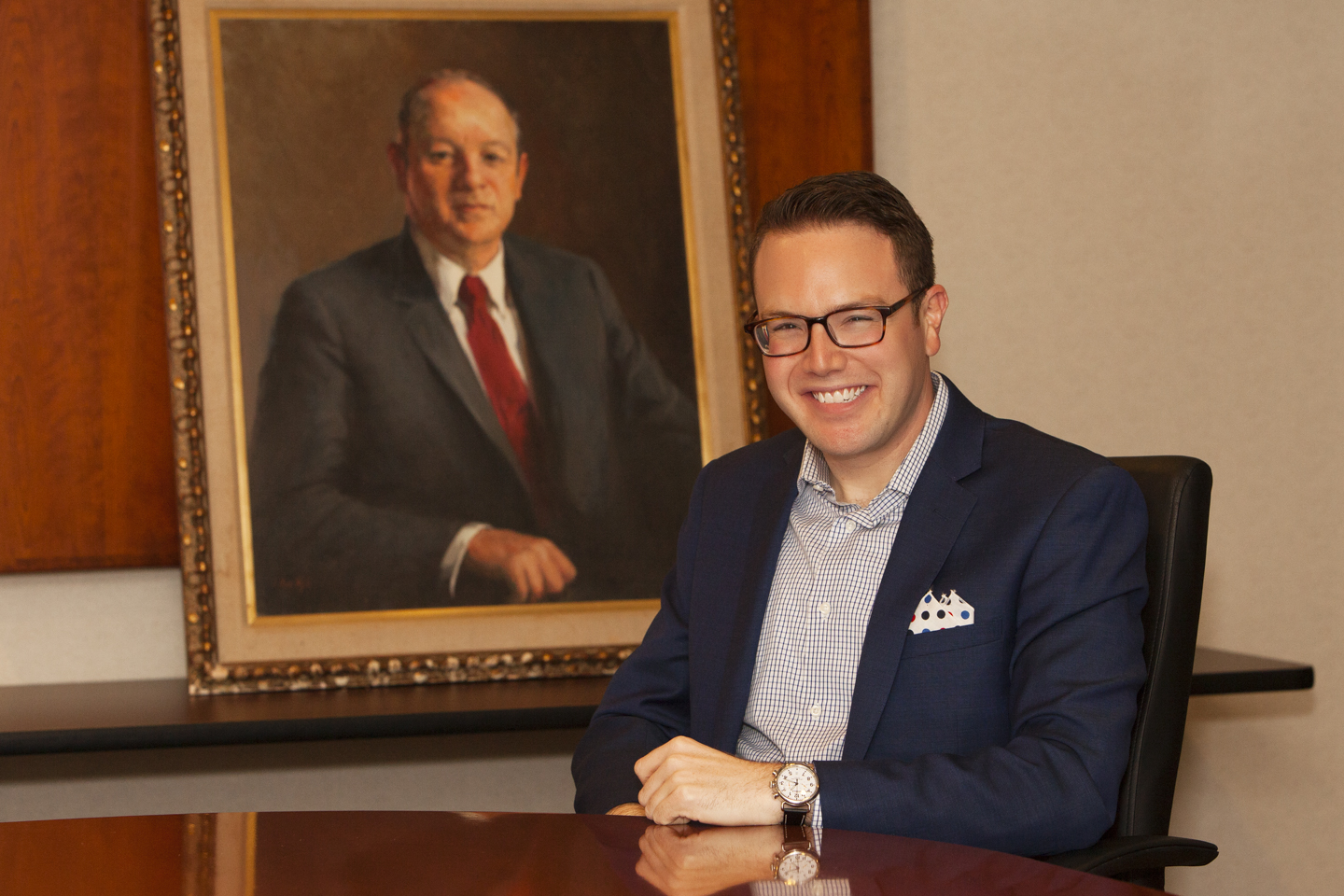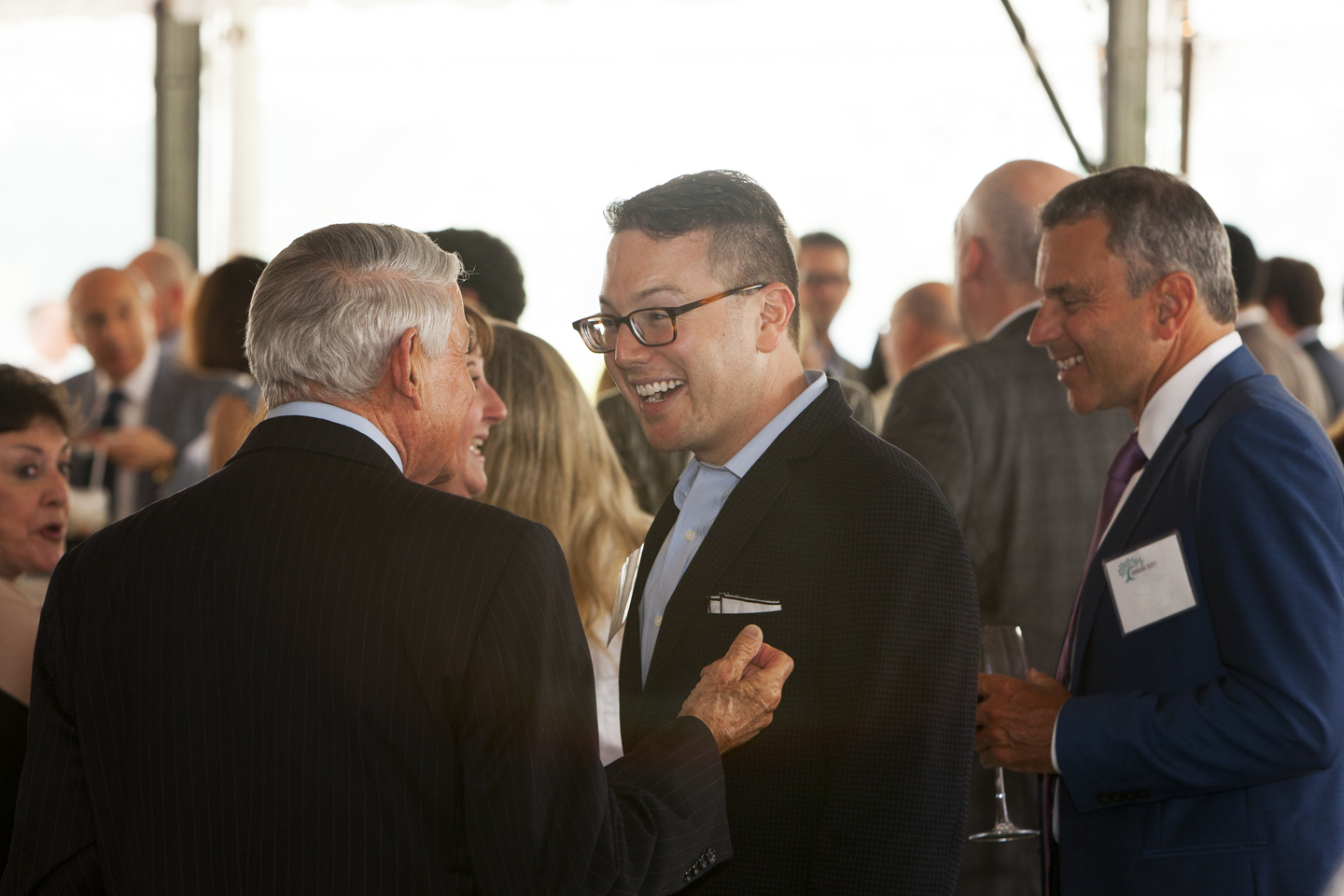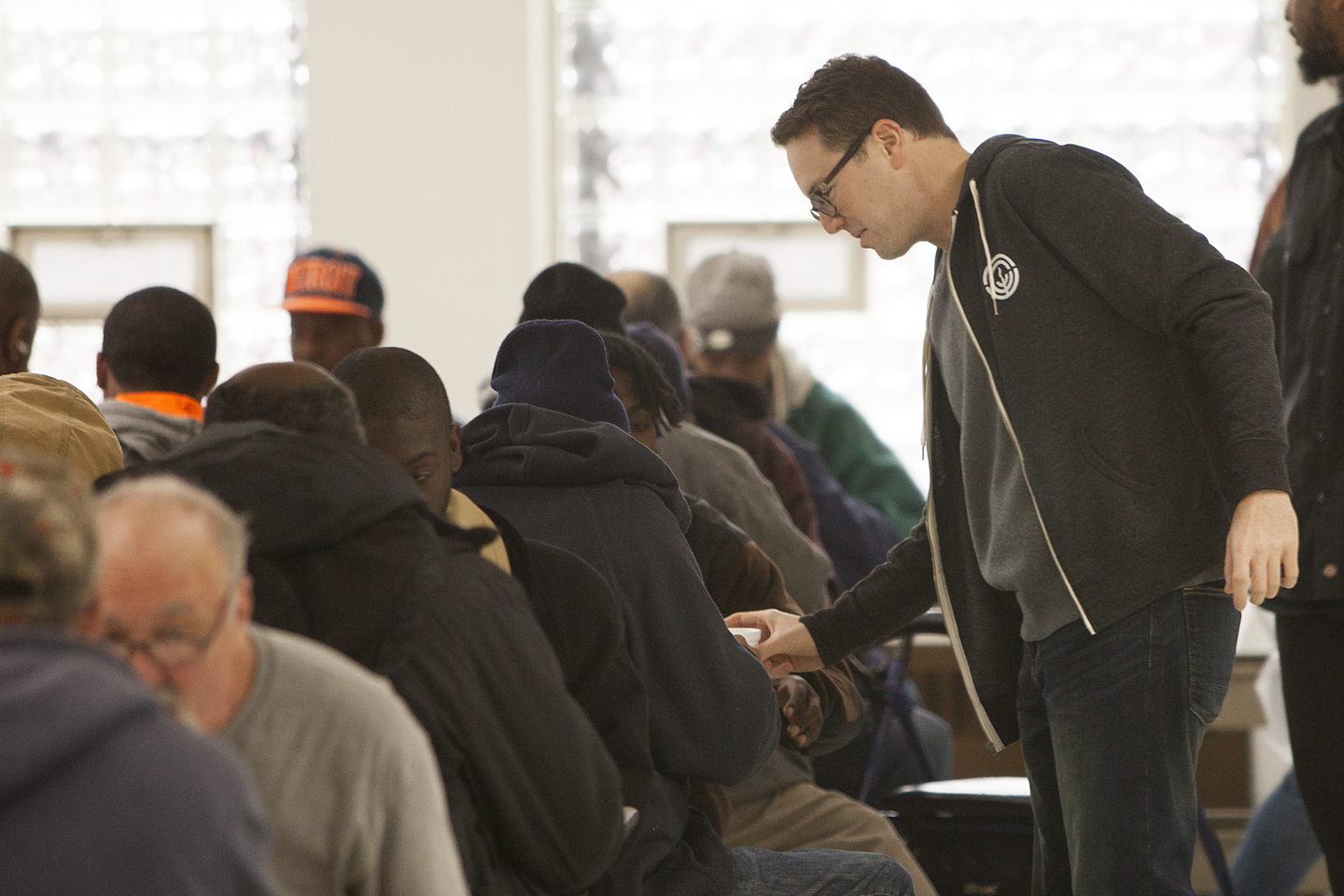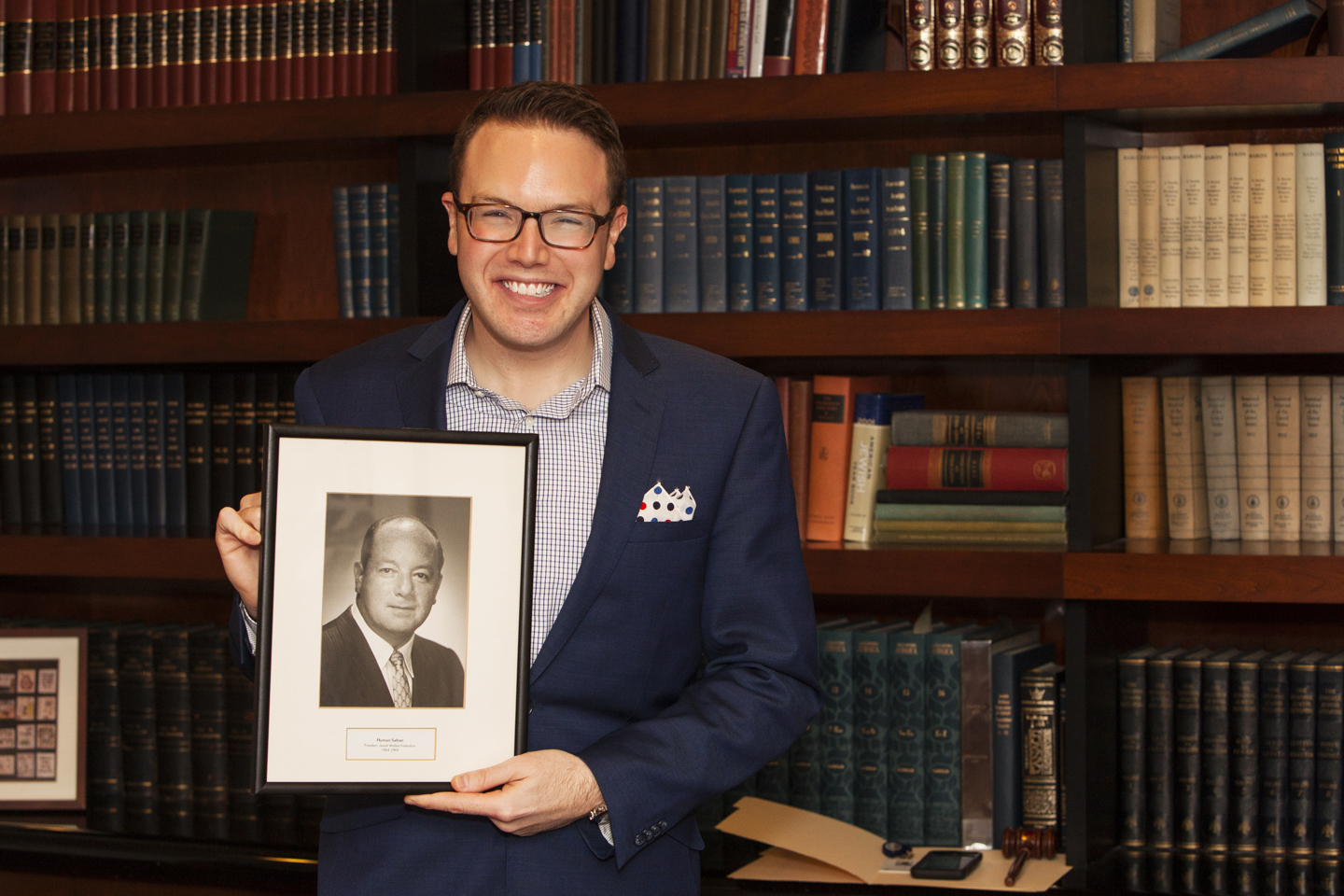by Vivian Henoch
Only time will tell whether Hy Safran has inherited the full measure of his grandfather’s charisma and stature in the Jewish community. From all indications, he is well on his way up the growth chart.
According to Federation CEO Scott Kaufman, Hy is an “old soul” with an old Jewish name – a name that reflects the legacy of his family, his passion for Jewish life and his gentle, rabbinic demeanor.

Here’s to life
Reflecting on his namesake, Hy shares, “I never had the privilege of knowing my grandfather – but I got the name. And with that comes responsibility. Knowing that I will never be able to replicate my grandfather’s influence and service to the community, it is my hope to honor his legacy by doing a fraction thereof. That is a motivator for me.”
As Associate Director of Philanthropy at Federation, Hy is responsible for the development of relationships with some of Greater Detroit’s most generous Jewish community members. With deep roots in the community, he is skillful in cultivating relationships with donors to grow Federation’s annual campaign and endowment encouraging families to make philanthropic impact for generations.
Many Jewish Detroiters still recall Hy’s grandfather – a prominent business leader on a national scale. As President of the Safran Printing Company, he was an innovator in the industry. A Jewish communal leader for several decades and a recipient of the prestigious Fred M. Butzel Award in 1970, Hy Safran was recognized for his service in numerous executive roles including President of Congregation Shaarey Zedek; President of the Jewish Federation of Metropolitan Detroit, 1964-69, ( following the term of Max M. Fisher); first Chair of the Institute of Jewish Life; Vice President of the Jewish Telegraph Agency (JTA) and Jewish War Veterans.
Fast forward two generations
Hy Safran joined Federation in 2015 with a résumé few people achieve in a lifetime. From Hillel Day School to Groves High School, from Columbia University to the Jewish Theological Seminary, from Israel to Iowa, from the Obama Campaign trail to Washington, from President Barack Obama’s National Constituency Director to Chief Director of Strategic Affairs in the U.S. Senate. In addition to all that experience before coming to Federation, Hy served on the boards of Congregation Shaarey Zedek, Humble Design, Jewish Community Relations Council, Jewish Theological Seminary Detroit Chapter, Jewish Federation NEXTGen Executive Committee, Oakland County Community Health Coalition, Anti-Defamation League Young Adult Division, JARC Young Leadership Division.
And then there’s baseball: For Hy, whose family has held front row season tickets for more than seven decades, baseball is not just a pastime, it’s tantamount to a second career. Hy’s unbridled enthusiasm for the Tigers is legendary and often captured on the stadium Jumbotron, on TV broadcasts, MLB social media and official team TV commercials.
Hy on Hy: Past and Present
myJewishDetroit: Let’s go first to your “backstory” and talk about your grandfather. Please paint us a picture of Hy Safran.
How do you talk about someone you’ve come to love, but have never known in life? You do it through collecting little anecdotes from others. Not a week goes by where someone doesn’t ask, “Did you know Hy Safran? How are you related?”
Though he died 35 years ago, my grandfather’s legacy is still felt by many in the business, philanthropic and Jewish community circles. And certainly, among an older generation – those who remember Max M. Fisher, Bill Berman and so many others who have built the foundation of what Jewish Detroit is today – the name Hy Safran triggers memories of this larger-than-life community figure.

I have come to know my grandfather through the stories of others – stories that speak to his influence and creativity in business, his generosity of spirit and his deep passion for growing and strengthening the Jewish community locally and globally.
I hear stories about his many visits to Israel, both before and after Statehood. I hear stories about the hours he put in at Shaarey Zedek—about the campaigns he pushed for at Federation. I hear of a family man intent on providing a Jewish environment for his kids . . . and of a husband who adored his wife, my grandma Leah – who I knew and remember with love.
My grandfather had four children, each four years apart. My aunt was 12 when my father, James A. (Jim) Safran, the youngest of the four was born, so my aunts and uncles each see my grandfather from a different perspective – at a different stage of life. Through all these stories – and conversations with community members – I fill in the puzzle of who Hy Safran was.
Hy on family
myJDet: And where does your father fit into the puzzle?
My dad is the link of course, but naturally he developed his commitment for Jewish community under the influence of his father. And beyond that, my dad has been the connecting point for me with some notable coincidences. For example, the last photograph ever taken before my grandfather passed away was at my father’s installation as Federation’s Junior Division President; it was under my father’s leadership that the Junior Division became the Young Adult Division (YAD); and when I was an executive officer of YAD, we became NEXTGen Detroit. Like my grandfather, my dad was President of Congregation Shaarey Zedek and, currently, I serve on its Board of Trustees.
I always have admired my dad for his leadership in the Jewish community; relating to him was often through Judaism – both in ritual and in ways of giving back to the community.
Through the generations, Judaism has been the glue that holds our family together. My father grew up in Hy and Leah Safran’s home, which meant that every Friday night was Shabbat dinner with all the fixings and trimmings and the blessings before and after the meal. My family enjoyed that too. Every Friday, we had a traditional Shabbat meal and our dad would bless us. And to this day, I have Shabbat dinner every Friday night; I never miss – no exceptions! For me, Shabbat is a special time and sacred space.
Because of my dad’s involvement in Shaarey Zedek, I spent a lot of time there and grew up with a reverence for Rabbi Groner. He took me under his wing; we’d talk about all sorts of things where discussions often led to Torah study.
Hy on higher education, mixing religion and politics
myJDet: You hold two separate B.A. degrees from Columbia University and the Jewish Theological Seminary (JTS), attending and graduating from both schools at the same . . . how did that work?
Seven or eight classes a semester, including summers! It sounds ambitious, but the truth is I love academics, love the deep dive into texts, whether the subject is political theory, American government, art history, Chumash, Jewish law, Jewish history and culture. It’s all exciting to me.
As far back as I can remember, I have been drawn to politics – a profession where my extroverted personality and love of community service intersect. High school at Groves was the tipping point for me, I was in my element in student government – loved the interaction between different religious, ethnic and cultural groups. And that experience – coupled with a drive for a global perspective – was the switch that turned me away from the expected route of U. of M. to Columbia and JTS in Manhattan.
New York City suited my desire to study art, history, music, government and have it all. Instead of sitting in the library, I’d go to the Frick, the Guggenheim, the MET, the MOMA, Lincoln Center, the U.N. or City Hall – the whole city was my syllabus and I loved it.
All told, I earned a B. A. in Political Science from Columbia simultaneously with a B.A. in Bible and Ancient Semitic Languages at the JTS and graduated from both schools in four years. I was the first-ever student to serve as an executive officer of the JTS and the Columbia student body at the same time; I even had the honor of being the commencement speaker at my graduation from Columbia in 2006.
Manhattan was my proving ground, a magnificent place to get into politics on a national scale. I started as a volunteer with the Joe Lieberman Campaign for President in 2004, then with the John Kerry Campaign after the primaries.
And, in my work today, I continue to draw upon the two degrees I’ve earned as well as all that political and community interaction – weaving bits of Jewish law and ethics or history into discussions with our community members. I also study regularly with Rabbi Leiby Burnham – whom I consider to be my primary havrutah – study partner.
Hy on Israel
I was a participant in Federation’s Teen Mission to Israel in 2000; six years later, Federation offered me the opportunity to staff the Teen Mission. My plan was to go to Israel with Federation, then stay for a year, take the time to travel and explore Israel in a more thoughtful engaging way, seeking to interact with other cultures.
I like to call that year “Hy’s Mid-East Adventure.” From Jerusalem as home base, I traveled throughout the entirety of Israel and a dozen countries throughout Europe and the Middle East, deepening my appreciation for a global perspective while constantly remaining distinct, proud of my Jewish heritage.
In Israel, I was never a tourist. I would wake up every morning and give myself a destination to meet people and learn. I’d take a week and go to the Negev Desert and camp. I spent time in Judea and Samaria in the West Bank with Jews, Druze, Bedouins, Christians and Muslims. In Jerusalem, I would frequent the Old City and develop friendships with Jews of all backgrounds, Arab Muslims, Ethiopians and Yemenites, to name a few. I paid visits to Druze Israelis in the North and with religious Jews on a farm in the coastal region. The year abroad furthered my education in ways no university degree could ever achieve for me.
Hy on politics
myJDet: How did you get involved with the Obama Campaign?
I had been following Obama – a fellow Columbia graduate – watching U.S. politics from a distance in Israel. I remembered how he galvanized the 2004 DNC with his speech – “Not red states, not blue states, United States!” And I believed. If he chose to run, the country was ready, and he could win.
So, with no political connections or relationships whatsoever, I did everything to get my résumé in front of the Obama team. Long story short, I moved from Israel to Iowa — got a job early on with the Campaign, “Obama for America.” When I arrived in Iowa, we were 27 points down in the polls. We were just a handful of full-time staff, but we had a plan, we were organized. I was given the nickname “The Converter” because I have a talent for friendly persuasion and on January 3, 2008, we won Iowa.
Shortly thereafter, I was promoted to National Constituency Director. It was a special time – interacting one-on-one with then Senator Obama over 2 a.m. pizza meetings discussing policy or alone on stage with him in front of thousands of people. The photos of those moments are treasures and those memories are vivid.
After a year and a half working with Obama, the DNC put me in touch with Gary Peters, who would become U.S. Representative for my hometown Congressional District. I was looking for a new challenge – to be a bigger fish, albeit in a smaller pond. My role as Congressional Outreach Director in the U.S. House and later, as Director of Strategic Affairs in the U.S. Senate, included work in Washington and Michigan and brought me back home, where ultimately I wanted to be and felt I could do the most good.
Hy on Federation
myJDet: So, from the “The Converter on the Hill,” how did you become “The Closer” at Federation?
Three years ago, while I was still serving as an Executive Officer of NEXTGen Detroit, Scott Kaufman and I were talking about what’s next down the road for me. There was no pressure for me to leave the job in politics. In the purest sense, I love the give-and-take, the building of diverse relationships, the complexity and the potential of government to structurally move the world forward. What drew me to the prospect of communal work with Federation and what compels me to this day is the undeniable fact that we deliver results for those in need.
Coming to Federation was the “selfish” move. Now I’m working for my family, my community, my identity as a Jew. I am a product of this community, abundantly grateful for the generosity of others, so fortunate to be a Detroiter at this transformational time in history – and I want to encourage others to become involved and give back to help build an even Greater Detroit for the next generation.
Funny story: just recently, in the final weeks of Federation’s 2017 Campaign fundraising cycle, a colleague came to me and asked that I try to secure a charitable pledge from an older gentleman who had not given for years. “He’s a tough one,” I was told.
So, I called, and a woman picked up, and asked who’s calling. I gave her my name and asked if the gentleman was available to speak to me. A minute goes by; he picks up the phone and angrily he asks, “Who is this?!” I answer, “Hello, my name is Hy Safran; I hope I caught you at an appropriate time.” He responds, “How dare you call me and pretend to be the ‘great Hy Safran!’ Who do you think you are? Hy Safran passed away over 30 years ago, shame on you!” And of course, I have the perfect answer to his tirade: “You are right, sir . . . Hy Safran was my grandfather, he passed away 35 years ago, and let me tell you what I’m doing today.”
That little bump in the road, turned into a lovely conversation where we exchanged stories and the gentleman made his pledge over the phone— with the invitation to meet when the weather warms up. And that’s relationship building – what it’s all about.
Hy on “Words of Wisdom”

myJDet: What would you say to someone considering a career move to Jewish communal work?
You have to want it. You have to have a hunger and a passion to connect and relate to others – to help people. It is very rewarding work, because, as I always say, we deliver results. I can take you five minutes in any direction from the Max M. Fisher Federation Building and show you the projects, the programs and all the people that the dollars raised through Federation are impacting for the benefit of the health, education, social life, careers and Jewish life of our community.
MyJDet: A final question for the Jewish scholar in you: what words to live by can you offer for today?
Here’s a favorite: According to Jewish thought (and cited in Pirkei Avot, Chapter 1:15), we are told to “Greet every person with a pleasant disposition, a cheerful face.” In other words, smile. It sounds so simple, but as I read it, it also means that every stranger is a potential friend. You never know who you’re going to meet. A smile is the first step of reaching out and treating everyone with respect.




